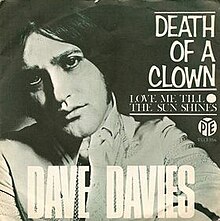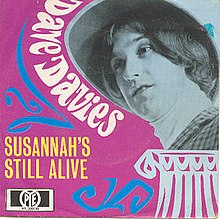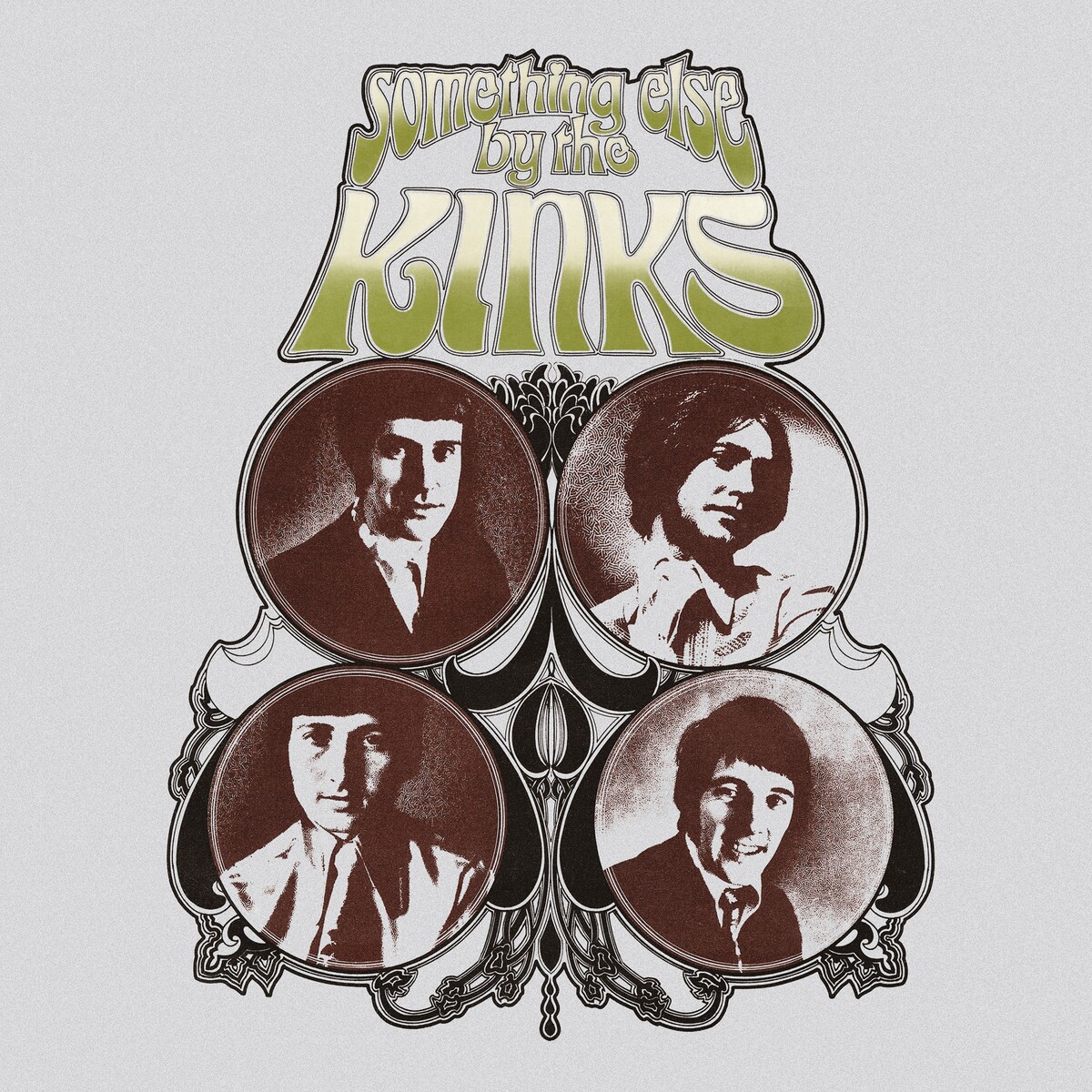
Rock and roll music
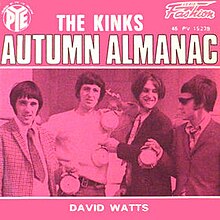
1967 single by the Kinks
"Autumn Almanac" is a song written by Ray Davies and recorded by the rock group the Kinks in 1967. "Autumn Almanac" has since been noted for being an "absolute classic",[3] "a finely observed slice of English custom",[4] and a "weird character study",[5] and praised for its "mellow, melodic sound that was to characterize the Kinks` next [musical] phase..."[6] Some have placed this and other Davies compositions in the pastoral-Romantic tradition of the poetry of Wordsworth, among others.[7]
Leer másSingles chronology
Autumn Almanac
The Kinks
Label: Pye (UK) Reprise (US) · · Productor: Ray Davies
CHARTS
UK
AUS
CAN
GER
IRE
NLD
NZ
|
1
|
Autumn Almanac
The Kinks •
w: Ray Davies •
1967 /10 /13
|
3:13 |
|
|
|
2
|
Mister pleasant
The Kinks •
1967 /10 /13
|
3:01 |
|
Album
Something Else by The Kinks
Fecha Lanzamiento: 15 September 1967 · Fecha Grabación: April 1966 - July 1967Discográfica: Pye · Estudio de Grabación: Pye, London · Productor: Shel Talmy (US) , uncredited (UK)
CHARTS
UK
FRA
GER
NOR
US
|
1
|
David Watts
The Kinks •
The Kinks •
w: Ray Davies •
1967 /09 /15
|
2:40 |
|
|
|
2
|
Death of a Clown
The Kinks •
The Kinks •
w: Ray Davies, Dave Davies •
1967 /09 /15
|
3:13 |
|
|
|
3
|
Two Sisters
The Kinks •
The Kinks •
w: Ray Davies •
1967 /09 /15
|
1:59 |
|
|
|
4
|
No Return
The Kinks •
The Kinks •
w: Ray Davies •
1967 /09 /15
|
2:02 |
|
|
|
5
|
Harry Rag
The Kinks •
The Kinks •
w: Ray Davies •
1967 /09 /15
|
2:16 |
|
|
|
6
|
Tin Soldier Man
The Kinks •
The Kinks •
w: Ray Davies •
1967 /09 /15
|
2:49 |
|
|
|
7
|
Situation Vacant
The Kinks •
The Kinks •
w: Ray Davies •
1967 /09 /15
|
3:15 |
|
|
|
8
|
Love Me Till the Sun Shines
The Kinks •
The Kinks •
w: D. Davies •
1967 /09 /15
|
3:17 |
|
|
|
9
|
Lazy Old Sun
The Kinks •
The Kinks •
w: Ray Davies •
1967 /09 /15
|
2:48 |
|
|
|
10
|
Afternoon Tea
The Kinks •
The Kinks •
w: Ray Davies •
1967 /09 /15
|
3:25 |
|
|
|
11
|
Funny Face
The Kinks •
The Kinks •
w: D. Davies •
1967 /09 /15
|
2:16 |
|
|
|
12
|
End of the Season
The Kinks •
The Kinks •
w: Ray Davies •
1967 /09 /15
|
2:57 |
|
|
|
13
|
Waterloo Sunset
The Kinks •
The Kinks •
w: Ray Davies •
1967 /09 /15
|
3:14 |
|
| "Autumn Almanac" | ||||
|---|---|---|---|---|
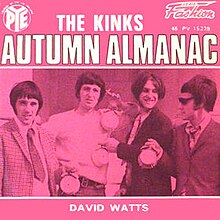 French picture sleeve | ||||
| Single by the Kinks | ||||
| B-side |
| |||
| Released |
| |||
| Recorded | September 1967[1] | |||
| Studio | Pye, London | |||
| Genre | Pop[2] | |||
| Length | 3:05 | |||
| Label | ||||
| Songwriter(s) | Ray Davies | |||
| Producer(s) | Ray Davies | |||
| The Kinks singles chronology | ||||
| ||||
Review
1967 single by the Kinks
"Autumn Almanac" is a song written by Ray Davies and recorded by the rock group the Kinks in 1967. "Autumn Almanac" has since been noted for being an "absolute classic",[3] "a finely observed slice of English custom",[4] and a "weird character study",[5] and praised for its "mellow, melodic sound that was to characterize the Kinks` next [musical] phase..."[6] Some have placed this and other Davies compositions in the pastoral-Romantic tradition of the poetry of Wordsworth, among others.[7]
Leer másIn his 1995 autobiography X-Ray and in subsequent performances of his VH1 Storytellers effort, Davies described the song as being inspired by a local hunch-backed gardener in his native Muswell Hill neighbourhood of North London.
"Autumn Almanac" was a non-album single[8] in between 1967`s Something Else by the Kinks and 1968`s The Kinks Are the Village Green Preservation Society. The song was a big success in the UK, reaching #3 on the singles chart, but not in the US, where it failed to chart on the Billboard Hot 100. Like many recordings of the mid-to-late 1960s, "Autumn Almanac" was released in both mono and stereo versions. The mono version was released as single and appears as a bonus track on the 1998 CD reissue of Something Else by The Kinks as well as most compilations. The stereo version, which is ten seconds longer and features more psychedelic audio effects such as a tape loop during the fadeout, appears on the 1972 compilation The Kink Kronikles as well as the deluxe 2-CD reissue of Something Else.
Dave Davies spoke highly of "Autumn Almanac" in an interview with Yahoo!, saying, "I was playing through `Autumn Almanac` [recently] and it’s a phenomenal recording. You can understand why it has lasted so long."[9]
Damon Albarn named the song as likely his favorite Kinks song in a 1995 interview, stating, "I think `Dead End Street` and `Autumn Almanac` are my favourites. Primarily because there are so many bits to them and they’re so graphic. I could pick at least 20, but off the top of my head those are my favourites. `Autumn Almanac` is probably my favourite."[10]
Personnel
According to band researcher Doug Hinman:[1]
The Kinks
- Ray Davies – lead vocal, acoustic guitar
- Dave Davies – backing vocal, electric guitar
- Pete Quaife – backing vocal, bass
- Mick Avory – drums
Additional musicians
- Rasa Davies – backing vocals
- Nicky Hopkins – piano,[nb 1] Mellotron[nb 1]
1967 single by the Kinks
"Autumn Almanac" is a song written by Ray Davies and recorded by the rock group the Kinks in 1967. "Autumn Almanac" has since been noted for being an "absolute classic",[3] "a finely observed slice of English custom",[4] and a "weird character study",[5] and praised for its "mellow, melodic sound that was to characterize the Kinks` next [musical] phase..."[6] Some have placed this and other Davies compositions in the pastoral-Romantic tradition of the poetry of Wordsworth, among others.[7]
In his 1995 autobiography X-Ray and in subsequent performances of his VH1 Storytellers effort, Davies described the song as being inspired by a local hunch-backed gardener in his native Muswell Hill neighbourhood of North London.
"Autumn Almanac" was a non-album single[8] in between 1967`s Something Else by the Kinks and 1968`s The Kinks Are the Village Green Preservation Society. The song was a big success in the UK, reaching #3 on the singles chart, but not in the US, where it failed to chart on the Billboard Hot 100. Like many recordings of the mid-to-late 1960s, "Autumn Almanac" was released in both mono and stereo versions. The mono version was released as single and appears as a bonus track on the 1998 CD reissue of Something Else by The Kinks as well as most compilations. The stereo version, which is ten seconds longer and features more psychedelic audio effects such as a tape loop during the fadeout, appears on the 1972 compilation The Kink Kronikles as well as the deluxe 2-CD reissue of Something Else.
Dave Davies spoke highly of "Autumn Almanac" in an interview with Yahoo!, saying, "I was playing through `Autumn Almanac` [recently] and it’s a phenomenal recording. You can understand why it has lasted so long."[9]
Damon Albarn named the song as likely his favorite Kinks song in a 1995 interview, stating, "I think `Dead End Street` and `Autumn Almanac` are my favourites. Primarily because there are so many bits to them and they’re so graphic. I could pick at least 20, but off the top of my head those are my favourites. `Autumn Almanac` is probably my favourite."[10]
Personnel
According to band researcher Doug Hinman:[1]
The Kinks
- Ray Davies – lead vocal, acoustic guitar
- Dave Davies – backing vocal, electric guitar
- Pete Quaife – backing vocal, bass
- Mick Avory – drums
Additional musicians
- Rasa Davies – backing vocals
- Nicky Hopkins – piano,[nb 1] Mellotron[nb 1]
More Albums same artist
The Kinks - Autumn Almanac (Official Audio) · Channel: The Kinks · 3m 6s





